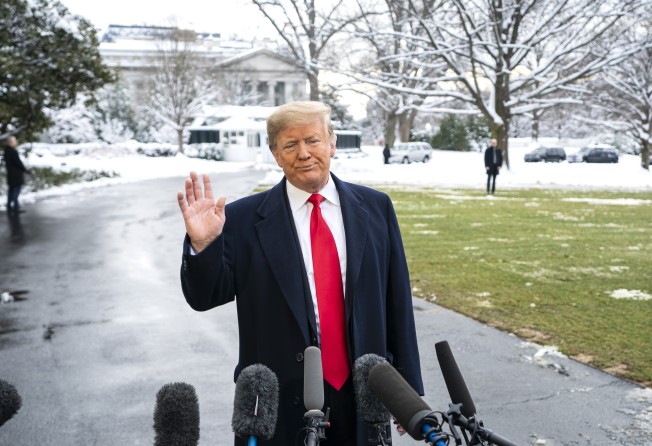Donald Trump signals interest in a China trade truce, but it may already be too late for the global economy
- Nicholas Spiro says the damage has been done: both the US and Chinese economies are slowing and the overall rift in relations will persist even if Trump backs down on tariffs

Has the sharp decline in America’s stock market – still down almost 9 per cent from its peak at the beginning of last October, despite a fierce rally since Christmas – given President Donald Trump a stronger incentive to strike a trade deal with China?
Having treated the benchmark S&P 500 index as the best measure of his administration’s performance, Trump has been rattled by the recent slump in America’s once-resilient equity market, according to White House officials, and is reportedly more willing to de-escalate the conflict.
An article in The Wall Street Journal last Thursday suggesting that Treasury Secretary Steven Mnuchin was mulling scaling back tariffs on Chinese imports, coupled with a subsequent report by Bloomberg claiming that China has proposed measures to eliminate its trade surplus with America, are fuelling optimism in markets that a trade truce is at hand.
Leaving aside the strong resistance to a climbdown on tariffs from the trade hawks in the administration and the much bigger challenge of resolving the underlying problems bedevilling US-China relations, any easing of tensions in the coming weeks will do little to reverse the slowdown in the global economy over the past year.
While the blame for the current growth scare cannot be pinned entirely on Trump’s trade offensive, his brinkmanship has done a grave disservice to the global economy, so much so that America’s own performance has suffered.
The period of “US exceptionalism” in markets has faded significantly. Since the end of October, the MSCI Emerging Market Index, the leading gauge of stocks in developing nations, has risen 9 per cent compared with a 1 per cent gain for the S&P 500.
Emerging market stocks are now the most favoured region among fund managers, according to the latest survey by Bank of America Merrill Lynch.
More importantly, the US economy has begun to feel the strain. Last Friday, a gauge of consumer sentiment dropped to its lowest level since Trump was elected president. Higher tariffs have pushed up input prices, contributing to a squeeze on companies’ margins.
Although the risk of an outright recession in the coming quarters is low, companies’ earnings are expected to slow dramatically this year, falling from 20 per cent in the first three quarters of last year to an anticipated 7 per cent in the same period this year, according to FactSet, a US data provider.
What is more, Trump’s brinkmanship is also largely responsible for the partial shutdown of America’s government.
The budget stand-off with the Democratic Party over US$5.7 billion Trump is demanding to build a wall on the Mexican border has just entered its fifth week, the longest in history, with no end in sight.
Some 800,000 federal workers are on a leave of absence or are working without pay, posing a serious risk to growth. According to a note by JPMorgan published last Friday, “US domestic politics is replacing international risks like the trade war as a potential volatility generator”.
Trump’s aggressive trade actions have also made investors much more sensitive to China’s domestic economic woes, a development which Trump doubtless views as a sign that his administration is winning the trade war but which has backfired due to the adverse spillover effects on America’s economy and markets.
The news that China’s fourth-quarter gross domestic product growth fell to 6.4 per cent confirmed what the latest batch of monthly surveys and indicators have shown: a continued deceleration in activity stemming mostly from the 2½-year-old deleveraging campaign that is constraining Beijing’s ability to stimulate the economy.
The slowdown, moreover, is widely believed to be much sharper than the statistics suggest, given deep scepticism about the accuracy of official data.
While there have been signs that China’s economy may be starting to bottom out – data from the People’s Bank of China published last Tuesday showed that credit growth in December accelerated for the second straight month – sweeping stimulus akin to the big-bang measures of the past is unlikely.
Although this is mostly due to the surge in China’s debt levels over the past decade, the severe deterioration in US-China relations is also a factor.
As I mentioned previously, Trump’s belligerence and his disdain for multilateralism make Beijing less inclined to ride to the rescue of the global economy – at least not before it knows whether a trade deal is assured.
In a report published earlier this month, Gavekal, a Hong Kong-based advisory firm, noted that “China feels disinclined to rescue other big economies when its relationship with the world, and the US in particular, is so uncertain.”
A year ago this week, the International Monetary Fund hailed what it called “the broadest synchronised global growth upsurge since 2010”. When the IMF presents its latest forecast at this week’s World Economic Forum in Davos, Switzerland, it will describe what has become a synchronised slowdown. A trade truce, should one materialise, has come too late.
Nicholas Spiro is a partner at Lauressa Advisory